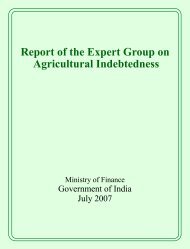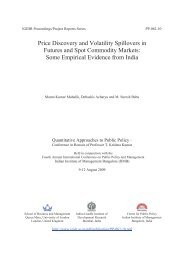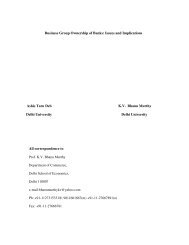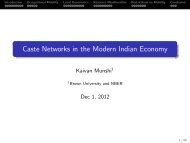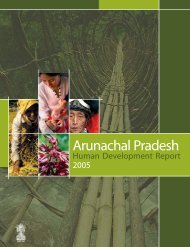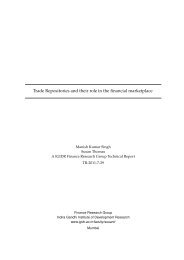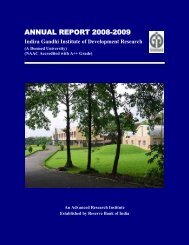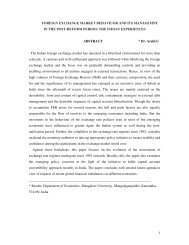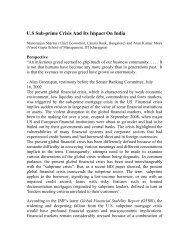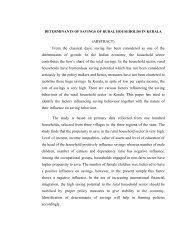Kerala 2005 - of Planning Commission
Kerala 2005 - of Planning Commission
Kerala 2005 - of Planning Commission
Create successful ePaper yourself
Turn your PDF publications into a flip-book with our unique Google optimized e-Paper software.
130<br />
are welcomed, more simple and down-to-earth<br />
technological changes in agriculture and related<br />
activities are opposed. There is also a fairly long<br />
history <strong>of</strong> opposition to technological change in such<br />
industries as coir processing and manufacturing. This<br />
creates imbalance in income, both within and across<br />
sectors. Those who work with ‘low’ technological<br />
base earn a low income and those who work with<br />
advanced technological base gain high income.<br />
Sectoral imbalance in productivity leads to income<br />
imbalance among workers. Therefore, a piecemeal<br />
approach to technological change is not a good policy<br />
from a larger social point <strong>of</strong> view. It will only aggravate<br />
income inequality.<br />
Opposing technological change has not resulted in<br />
job protection because industries and activities move<br />
away, as for instance in the case <strong>of</strong> coir processing/<br />
manufacturing and cashew processing and anything<br />
that involves employment <strong>of</strong> large numbers <strong>of</strong> workers.<br />
In agriculture, the result has been to move towards low<br />
labour absorbing crops. Thus, opposing technological<br />
change has neither served the immediate purpose <strong>of</strong> job<br />
protection nor the long-term objective <strong>of</strong> development.<br />
Given the fact that the younger generation in general,<br />
and the unemployed, in particular, are educated, they<br />
desire to work with technology than without it. It also<br />
contributes to their self-esteem providing better work<br />
conditions.<br />
waste its energy and resources in producing things that<br />
other regions can do better. The national economy<br />
<strong>of</strong>fers unrestricted access to the region’s products.<br />
It can also source capital and raw materials as well as<br />
available technology. It also <strong>of</strong>fers opportunity to tap<br />
the pool <strong>of</strong> talented skilled workers, pr<strong>of</strong>essionals and<br />
other knowledge workers. The context <strong>of</strong> economic<br />
liberalisation, both nationally and internationally,<br />
has further opened up these opportunities; there is<br />
now much greater degree <strong>of</strong> mobility for capital and<br />
labour. This can work against the interest <strong>of</strong> a regional<br />
economy like <strong>Kerala</strong>, if conditions are not favourable<br />
for investment. This is exactly what has happened to<br />
<strong>Kerala</strong>, as witnessed by the flight <strong>of</strong> capital and labour<br />
from the State.<br />
A regional development strategy in the context <strong>of</strong><br />
economic liberalisation also calls for a different role<br />
<strong>of</strong> the State – not a reduced role but a different role.<br />
On the one hand, it has to enhance the capabilities<br />
<strong>of</strong> its people to face new challenges. <strong>Kerala</strong> has done<br />
this to some extent through its social development<br />
but now has to go further by enhancing the quality <strong>of</strong><br />
such capabilities. The State also has to provide quality<br />
infrastructure and provide good governance to attract<br />
investment that will lead to the creation <strong>of</strong> desired<br />
employment.<br />
It should also be stressed that not all technological<br />
changes are labour displacing. Many technological<br />
changes such as hydrological (water control), biological<br />
(e.g. new and better seeds) and chemical (e.g. fertilisers<br />
and pesticides) are labour-augmenting.<br />
Innovation is a much broader concept than<br />
technological change. It has to do with not only new<br />
techniques but also doing things differently, including<br />
making new products, finding new sources, organising<br />
in new ways, etc. Recent examples <strong>of</strong> successful<br />
innovations are in the areas <strong>of</strong> ayurveda, tourism,<br />
ICT-based activities, food processing, garments and a<br />
variety <strong>of</strong> small things.<br />
2.3 Need for a Regional Development Strategy<br />
At the outset, any strategy for further development<br />
in <strong>Kerala</strong> should acknowledge the fact that the State<br />
is a regional economy within a very large national<br />
economy. This has to be consciously factored, lest it



